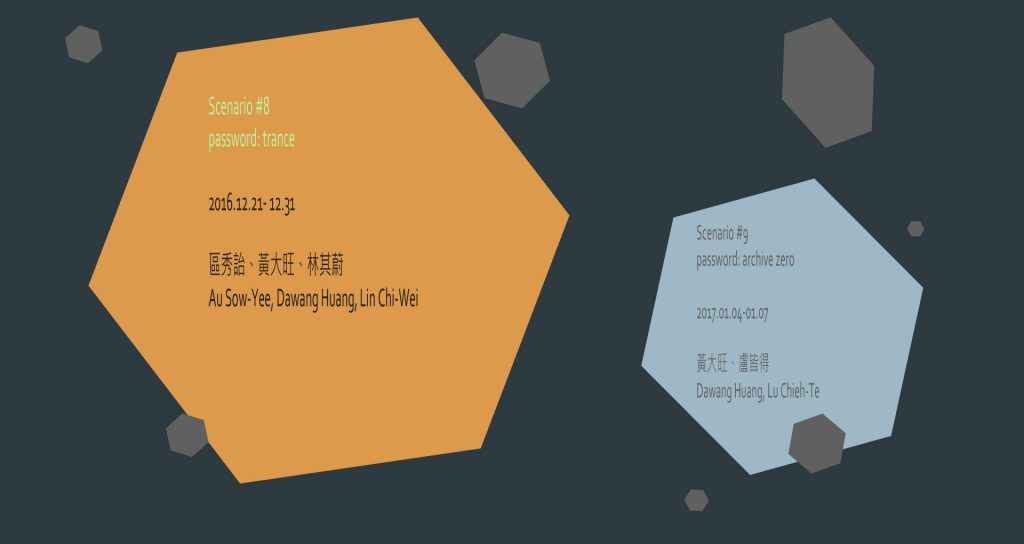For English, please scroll down.
出神
迷幻經驗,透過外力(藥物)突破身體與精神間的控制界線,使其中無意識的力量滲出,它是對規訓、治理力量的逃逸,對國家意識形態於健康身體、勞動力控管的反抗;而與國家戰爭機器對藥物生產與控管的緊密關係,使其在物質上與形而上都是一場被控制與躲避控制的戰鬥。而出神經驗同時也是對自我身份認同建構的逃出,對共同體的元神出竅。 像是在林其蔚《磁帶音樂》系列作品中,透過一個類似法輪的形象建立了一種儀式性的集體,感受一個集體精神性形成的過程,但同時亦引發著什麼是共同體的疑問,如同藝評陳泰松所指出的:「通過聲音喻指的共同體有一個悖論,它是一部機器,它的箝制與可能自治的自我演譯」(1)。
在《一線畫》、《雙線畫》一系列作品裡亦走在這個辯論的界線上,藝術家透過長期每日固定的描繪舉動,這是一種返回身體性的自我觀看,一個關於自我制域何在、邊界為何的測量,但也是一種規訓式的自我檢測,而這個不斷離體、返回的往返動態中,產生一個新的循環關係、一個新生的自我技術。
勸世
近一年間突然爆發的「勸世」風潮,帶著稱不上是「傳思音樂」(trance)的慢板台客舞曲、配上著極度「長輩」風的視覺美學,以一種如同普渡眾魯蛇的宗教般態勢逆襲了那些標榜「正向思考」與「小確幸」的主流文化。這些被稱為「洗腦歌」的曲子,合流於廉價化的台灣媒體文化、複製於自我沉溺、消極抵抗主流社會,代言夾縫中求生存的人生,超渡台灣一整個經濟衰退世代。而化身勸世阿伯的黑(暗校園民歌之)狼黃大旺以沒讀書又兼沒衛生的中年無聊男子之姿登場;極盡「長輩化」、台式唸歌、結合廉價套裝trance背景,勸世阿伯把歌唱歪的態度,反映著「正」史的缺席,阿伯的勸世是廟口前的反政宣、反衛生教育、反新生活運動(如:在《夢遊先公廟》裡揶揄「先總統蔣公」)。
「甘寧涼」(甘州街、寧夏路、涼州街)之旅不正是一趟長輩風的迷幻之旅,那些曲目訴說著日殖民時代的愛恨糾葛、大稻埕黃金年代的風華,而隱藏在懷舊圖像下的則是文創式文藝復興所掩蓋的底層故事,是滿藏在巷弄間的多種族群的性服務工作者、是被迫停業又面臨搬遷的「日日春」、漲價到不復本土的寧夏夜市文化、等待都更增值的待修整古厝。「甘寧涼」如其名是屬於巷弄暗角的咒譙。
離體
區秀詒的離體美學涉及著從一段漫長共同體建立歷史的解離過程。《克里斯計劃II:If the Party Goes On》與其說是對台灣電影史改寫可能的假設,不如說是將神岡空難設想為陸運濤(同時也是藝術家區秀詒自身)藉此「離體」的契機,化身成為了攝影師陸,進入那疊存與共在的時空。陸現身於當初馬來亞共產黨躲藏的雨林、那些從殖民時代即開始榨取資源的礦湖,寄魂在國泰克里斯電影中的人物裡,在《空中小姐》、《曼波女郎》那些去背、抽離原來時空的電影片段背後,如同最常以《羅摩衍那》(Ramayana)為劇碼的馬來皮影戲(這裡當然也暗指著被禁演的吉蘭丹皮影)操偶著,穿梭在各種不同變體的“party”、多種文化的神祇之間。如同「棉佳蘭」這不存在之邦國,陸的party代表的那種飄忽、移動、跨越性主體的想像是否有可能,還是它僅只是一種全球年代的鬼魅?
(1) 〈超渡共同體的音媒者 關於林其蔚個展「磁帶音樂 2004-2013」〉,陳泰松,2015。http://talks.taishinart.org.tw/juries/cts/2015021602
黃大旺
黃大旺身為非當機中後媒體時代吟遊詩人、即興表演家、聲音wiki活體百科,以其噪雜失衡卻精準深刻的肢體和語言在滔滔資訊流中展開時代性的辯證。他以「黑狼那卡西」創作演出廣為人知,也在同人誌創作、文化研究上自成一格,其狂廢的精神世界、溫暖與暗黑並行的身態在台上台下都劃出一道透徹反思社會的歪光。目前工作與生活於台北。
區秀詒
在區秀詒的影像語彙中藉其深究田調訪、文獻考所集結之生命經驗,以歷史語境的爬梳,反映於高度思辨的音像部署。其創作上的美學探討,一是對影像(史)生成機制和其幽靈的關注,以機械式電影放映機而作的現場電影;二是以錄像、觀念、裝置等混合形式,探討和擴延影像與影像製造以及政治、權力之間的關係。目前工作與生活於台北。
林其蔚
早期作品多以噪音、行為等表演關注各種機制秩序、人體、社會的衝突與暴力,這些被納入其獨特暗黑垃圾美學的系列企圖回返並解放身體——既是媒介、是主體也是規訓,更已經成為現代性病徵之所具。近來創作探索聲音結構、儀式、文明符碼與能量交織之晦暗神秘領域,轉化為對當下政治社會的另類批判性啟示寓言。目前工作與生活於台北。
Space-out
Psychedelic experiences, breaking the boundary of control between body and spirit, exude the energy of the unconscious through the power of drugs. This is the great escape from the power of discipline and governance, resisting the bio-politics of health and labor force imposed by ideological state apparatuses. Despite the close relationship between the state apparatus of war and production that facilitate the discovery of medicine and drug, both physical and metaphysical, the resistance is always a fight between control and avoiding control. The experience of space-out is also the line of flight of identity, an out-of-box of community.
In his Tape Music series, Lin Chi-Wei’s creates a ritualistic circumstance of collectivity through the figure of Dharmacakra, but also questions the concept of “community.” As art critic Taisung Chen notes “There’s a paradox in this community indicated through sounds. It’s a machine, the self-interpretation of muzzle and autonomy” (1). Lin’s Polygraph project also sits on the boundary of this paradox. It is a self-reflective view of a return to physicality as a measurement of its borders or self-regulation, but also a kind of disciplinary self-censorship. And during this movement of out-of-and-in-to-body, there comes out a new circulation, and a new technology of self-formation.
Moralization
Dawang’s pop-up local “trance” mania spreads out over a year with lento tempo. But trace rarely has an aesthetic which is popular with elder people. It takes a quasi-religious ceremony to counterattack mainstream culture which is “positive thinking” and “enjoy the little things in life”. The sticky music combines with commoditization of Taiwan’s media culture to recover self-absorption. It resists the world, only passively. It attempts to represent the struggles of life and exorcise the Recession Generation. Feigning his name as Uncle Moralizator, Dawang Huang acts as an uneducated and unsanitary pervert. He is extremely “elderize”, sings with a local accent and combines a Taiwanese rap with cheap trance backing music. The attitude of Uncle Moralizator reflects to the absence of “formal” history, anti-propaganda, anti-hygiene education and anti- New Life Movement, as he teases late president Chiang Kai-shek in Sleepwalking in Xian Gong Temple.
Dawang’s Following the Footsteps of Singing – A Tour Guide to Walk Local is a psyche-trip for elders. Old musical scores reveal the love and hate under Japanese occupation during the golden age of Dadaocheng, and, simultaneously, stories from the underclass covered by cultural creative industry and so-called Renaissance of Dadaocheng. Sexual service workers that contain various regions live in the streets. The Collective of Sex Workers and Supporters (COSWAS) being forced to close down and evicted, the culture of Ningxia night market is no longer local from price-increases, and old houses sit in wait for for the urban redevelopment and rise its value. “Gan-ning-liang” [a phononym for the Chinese equivalent to ‘fuck your mother’], the abbreviations of three local streets, shouts out the anger voice of the bottom of society.
Out-of-Body
The “out-of-body aesthetics” developed in Au Sow-Yee’s works relate to a process of dissolution from a long history of community construction. In Kris Project II: If the Party Goes On, she assumes the CT106 plane crash to envisage an out-of body moment for Loke Wan Tho – and also artist Au Sow-Yee herself. More than assimilating the incident as a possibility to rewrite Taiwanese movie history, Loke Wan Tho gets into a overlapping, simultaneous time-space by the name photographer Loke. He is embodied in the rainforests where the Communist Party of Malaya hid, by a mine lake which has been squeezed of all natural resources from colonial times. He possesses the characters in the Cathay-Keris’s movies from behind the Chroma-key effect. Manipulating movie sequences from Air Hostess and Mambo Girl as Wayang Kulit (Malaysian shadow puppet play), frequently drawing from Ramayana which was banned in Malaysia, Loke shuttles between different transfigured party and the gods of different cultures. As in the fictional utopia “Mengkerang”, does the indefinite, ambiguous trans-subjectivity presented in Loke’s “party” really exist? Or it is only the ghost of globalization era?
1. The Sound Psychic of Soul-releasing of Community, About Lin Chi-Wei’s Solo Exhibition Tape Music 2004- 2013, Taisung Chen, 2015. http://talks.taishinart.org.tw/juries/cts/2015021602
Dawang HUANG
Half-crashed post-media bard, improviser, living sound Wikipedia – Dawang Huang enacts an epic debate among the speedy data flow with his idiosyncratic noise-language and profoundly unbalanced bodily expression. Best known for his Blackwolf Nagashi performances, he has created a genre unto himself in fanzine and cultural studies. His wild ‘scum’ world and obscure, yet warm attitude he approaches the ethics of modern society via a crooked path. Huang lives and works in Taipei.
AU Sow-Yee
Au Sow-Yee’s work takes two approaches rooted in moving images. One is her continuing interest in image-making mechanism and its ghost, creating live cinema performances using mechanical film projectors. Second is to question, explore as well as expand the relation between images, image-making, politics and power, through video installations and other mediums. Through her artistic language and dialectical approach to audio-visual “mapping”, she depicts the accumulation of a ‘bio-archive’ from her investigation into historical contexts. Au lives and works in Taipei.
LIN Chi-Wei
Lin’s early noise and performance series concern the confrontation and violence among institutional power, people and society. Human body as medium, subjectivity, site of order and embodiment of modern symptoms are the subject of his liberation of movement in his peculiar gothic garbage aesthetic. His recent interests explore the mysterious realm amongst sound structure, ritual, symbol and energy, transforming them into alternative allegories to criticize the contemporary social and political conditions.

